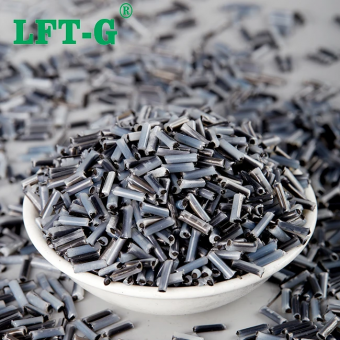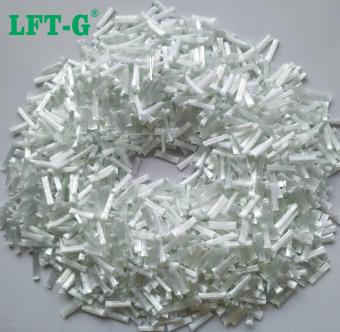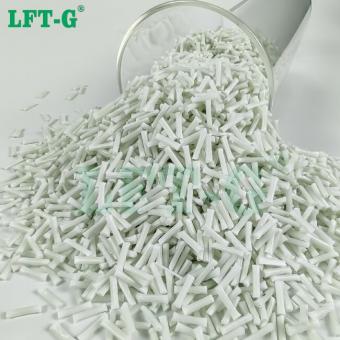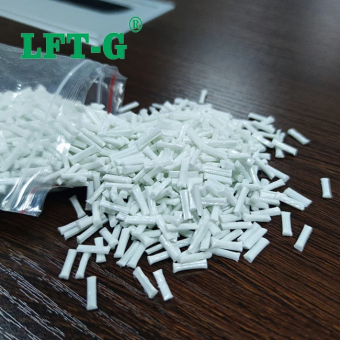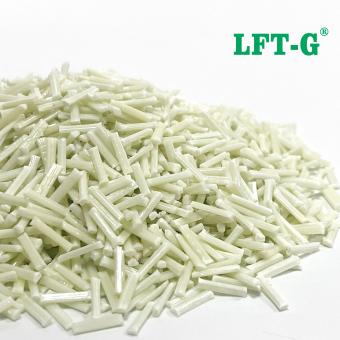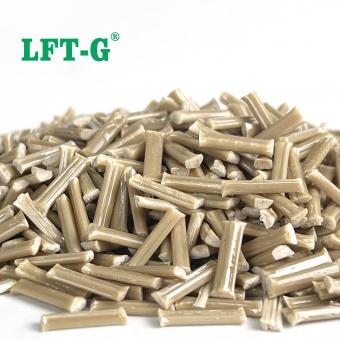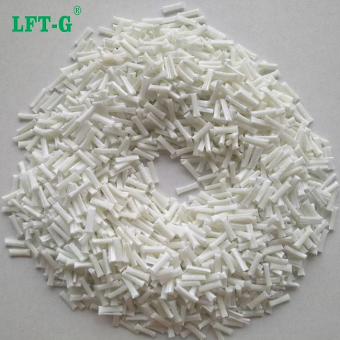-
LFT-G PLA polylactic acid long carbon fiber reinforced material black color 24h online replyPLA-LCF Polylactic acid or PLA is a bio-based polymer made using lactic acid from the sugar fermentation process. It was originally intended as a more environmentally friendly alternative to crude oil-based polymers and is technically biodegradable (albeit under industrial compost conditions). In addition to being the most widely used polymer in the desktop 3D printing space, PLA also has a variety of applications in packaging, disposable cups and more. Although it is very cost effective, easy to process and easy to 3D print, pure PLA has poor thermal and mechanical stability and is therefore not suitable for any high performance applications. One way to improve material properties is to use additives such as carbon fiber reinforced materials, as carbon fiber composites can provide an excellent mix of mechanical properties and heat resistance. Long carbon fiber reinforced PLA is an outstanding material that is strong, lightweight, has excellent layer bonding and low warpage. It has excellent layer adhesion and low warpage. Long carbon fiber PLA is stronger than other 3D-printed materials. Long carbon fiber filaments are not as strong as other 3D materials, but tougher. The increased rigidity of carbon fiber means increased structural support but reduced overall flexibility. It is slightly more brittle than regular PLA. When printed, the material is a dark glossy color that shimmers slightly under direct light. characteristic The fracture strain is moderate (8-10%), so the silk is not brittle, but strong toughness Very high melt strength and viscosity Good dimensional accuracy and stability Easy to handle on many platforms High attractive matte black surface Excellent impact resistance and lightness Application of long carbon fiber filliing PLA material Long carbon fiber filling PLA is an ideal material for frames, braces, shells, propellers, tools, instruments, etc. Virtually no bending will occur. Drone makers and RC enthusiasts especially like it. Ideal for applications requiring maximum stiffness and strength. Technology Package International trademarks and patents Related products PP-LCF PA6-LCF
- PLA resin lcf
- PLA raw material of lcf
- 30% of lcf pLA
- long carbon fiber filling plastic
- polylactic acid composite plastic
- injection grade lcf
Tags :
-
LFT-G PP polypropylene long carbon fiber reinforced material high performance blackLong Carbon Fiber In recent years, due to the growing demand for lightweight in various industries around the world (automotive, aerospace, military, building and civil engineering, etc.), and the increasingly strict requirements for the use of environmentally friendly and sustainable materials, the use of fiber reinforced thermoplastic composites in various industries has been increasing. Especially for carbon fiber reinforced composites, there is still a high recycling value after the products are discarded after completing their life cycle, and through effective recycling technology and methods, the cost of carbon fiber reinforced composites can be significantly reduced. The recovery method of fiber reinforced thermoplastic composites is closely related to the shape and forming method of fiber reinforced in resin. Take carbon fiber reinforced thermoplastic composites as an example. The reinforced forms of carbon fiber mainly include short fiber reinforced, long fiber reinforced and continuous fiber reinforced, and the main preparation method is melt forming. For thermoplastic resins with high melting point, such as polyetherimide (PEI) and polyetherether ketone (PEEK), solvent forming can be adopted. Due to the linear molecular structure of thermoplastic resin, it is easy to transform from solid state to liquid state at high temperature. Therefore, thermoplastic composite materials can be recycled by remelting and reshaping method, which is more recyclable than thermosetting resin matrix composite materials. PP-LCF datasheet Application Our materails all can be recycled At present, more and more companies are developing recycling methods for fiber reinforced thermoplastic composites. For example, the 2014 Chevrolet Corvette uses composite materials containing recycled carbon fiber in 21 body panel components, including doors, boot LIDS, side coops and fenders. Ford Motor Company has used recycled long carbon fiber and polypropylene (LCF/PP) composites to replace the original ASA engineering plastic as the rigid part of the A-pillar bracket in its 2018 Explorer sport utility SUV. About LFT-G Xiamen LFT composite plastic Co., Ltd. is a brand-name company that focuses on LFR&LFRT. Long Glass Fiber Series (LGF) & Long Carbon Fiber Series (LCF). The company's thermoplastic LFT can be used for LFT-G injection molding and extrusion, and can also be used for LFT-D molding. It can be produced according to customer requirements: 5~25mm length. The company's long-fiber continuous infiltration reinforced thermoplastics have passed ISO9001&16949 system certification, and the products have obtained lots of national trademarks and patents. In particular, the carbon fiber LFT series produced by our company has broken the technical blockade of foreign countries. For domestic: automotive, military parts, firearms, aerospace, new energy, medical equipment, electric wind energy, sports equipment and other fields require high-performance thermoplastic special engineering plastics. And other new technology innovation industries provide product and technical support.view more
-
PA6 LFT-G brand composite long carbon fiber polyamide 6 for manufacturing helmetsPA6 raw material Polyamide 6, also known as polycaprolactam or nylon 6(PA6), is a semi-transparent to opaque yellowish or milky white thermoplastic resin. The relative density of PA6 is 1.12~ 1.14g /cm3, the melting point is 219~225℃, the tensile strength is 68~83MPa, the compression strength is 82~88MPa, the low temperature resistance is good (-75℃ is not brittle), the wear resistance, self-lubricating and oil resistance is good. Due to the excellent structure and properties of PA6, more and more researchers at home and abroad have carried out important research and development on PA6, including exploring new polymerization chemicals for production, changing its structure and properties, and finding new processing methods, etc. PA6-LCF Long carbon fiber (LCF) reinforced nylon composites with high specific strength, high specific modulus, high temperature resistance and other excellent properties, expand the application space of nylon high technology field, is one of the most important reinforced composites at present. TDS Tested by us, for reference only. Application Injection technology About us Come and contact us now!
- PA6 long carbon fiber
- PA6 LCF
- Nylon 6 composite materials
- injection molding industrial plastic
- PA6 resin
- compond plastic
Tags :
-
Nylon12 PA12 modified plastic long carbon fiber reinforced mateials higher toughnessPA12 Long carbon fiber The scientific name of PA12 is polydodecactam, also known as nylon 12. The basic feedstock of its polymerization is butadiene, which can rely on petrochemicals. It is a semi-crystalline - crystalline thermoplastic material. PA12 is a good electrical insulator and will not be affected by moisture as other polyamides. It has good impact resistance mechanical and chemical stability. There are many improved varieties of PA12 in terms of plasticizing and reinforcing properties. Compared with PA6 and PA66, these materials have lower melting point and density, and have very high moisture recovery. TDS Application Exhibition We will offer you: 1. LFT & LFRT material technical parameters and leading edge design; 2. Mold front design and recommendations; 3. Provide technical support such as injection molding and extrusion molding.
- Modified PA12 materials
- Nylon12 polyamide12 fiber
- pa12 resin
- LCF PA12
- PA12 car parts engineering plastic
- PA12 filling long carbon fiber
Tags :
-
LFT-G PEEK high quality modified materials fill long carbon fiber for automotives good performanceWhat is PEEK? Polyether ether ketone (PEEK) is a semi-crystalline thermoplastic polymer material with rigid benzene ring, compliant ether bond and carbonyl group which can promote the intermolecular force in its molecular chain. PEEK has excellent wear resistance, electrical insulation, anti-radioactivity, chemical stability, biocompatibility and thermal stability. In addition, PEEK is reusable and has a high recovery rate. PEEK is widely used in aerospace, electronic and electrical appliances, biomedicine, Marine protection, automobile industry and other fields. PEEK material is an inert material with low surface free energy, and its mechanical properties and frictional properties cannot meet the needs of some special fields. Therefore, it is necessary to modify PEEK composite material to improve its comprehensive properties. At present, filling modification and blending modification are the main methods for preparing PEEK composite materials. Filler modified reinforcement materials mainly include fiber, inorganic particles and whisker; The polymer used for blending modification should have similar polarity and solubility to PEEK. The interface modification method can improve the interface adhesion and enhance the comprehensive properties of PEEK composites. What is PEEK-LCF? As a filling system, fiber can effectively carry part of the load, and the synergistic action between fiber and PEEK can improve the comprehensive performance of composite materials. Carbon fiber and glass fiber are widely used as filler modified composites because of their high strength, high modulus and high durability. Long carbon fiber (LCF) can be used as heterogeneous nucleating agent to promote the crystallization of PEEK in composite materials, which can effectively improve the mechanical and tribological properties of composite materials. PEEK/CF composites of different lengths were prepared by injection molding, and their infiltrating and tribological properties were studied. The results show that the addition of CF increases the contact Angle and decreases the hydrophilicity of the composites. But the friction coefficient of composites is reduced and the friction resistance is improved. Long carbon fiber (LCF) has better effect on reducing friction coefficient than short carbon fiber (SCF). TDS for reference Application Q&A 1. What are the advantages of long carbon fiber materials? A: Thermoplastic LFT Long carbon fiber material has high rigidity, good impact strength, low warpage, low shrinkage, electrical conductivity and electrostatic propertiea, and its mechanical properties are better than glass fiber series. Long carbon fiber has the characteristics of lighter and more convenient processing to replace metal products. 2. Are there any special process requirements of long carbon fiber injection molding products? A: We must consider the requirements of long carbon fiber for the injection molding machine screw nozzle, mold structure and injection molding process. Long carbon fiber is a relatively high cost material, and need to evaluate the cost performance problem in the selection process. 3. The cost of long fiber products is higher. Does it has a high recycling value? A: The thermoplastic LFT long fiber material can be recycled and reused very well. We will offer you: 1. LFT & LFRT material technical parameters and leading edge design 2. Mold front design and recommendations 3. Provide technical support such as injection molding and extrusion molding
- PEEK resin lcf
- Polyether ether ketone filled lcf
- instead medal plastic peek
- injection molding platic peek
- long carbon fiber series
- higher toughness peek lcf
Tags :
-
LFT-G brand PP LCF long carbon fiber 30% modified plastic higher strength original colorCarbon Fiber Reinforced Plastic Carbon fiber reinforced plastic composite (CFRP) is a lightweight, strong material that can be used to make a wide range of products used in everyday life. It is a term used to describe fiber reinforced composites with carbon fiber as the main structural component. Note that the "P" in CFRP can also stand for "plastic" rather than "polymer." Typically, CFRP composites use thermosetting resins such as epoxy, polyester, or vinyl esters. Despite the use of thermoplastic resins in CFRP composites, "carbon fiber reinforced thermoplastic composites" often uses its own acronym, CFRTP composites. LFT-G focuses on LFT&LFRT. Long Glass Fiber Series (LGF) & Long Carbon Fiber Series. Compared with Short Carbon Fiber, Long Carbon Fiber has more excellent performance in mechanical properties. It is more suitable for large products and structural parts. It has 1-3 times higher (toughness) than Short Carbon Fiber, and the tensile strength(strength and rigidity) is increased by 0.5-1 times. Properties of CFRP composites Composites reinforced with carbon fiber are different from other FRP composites that use traditional materials such as glass fiber or arylon fiber. Advantages of CFRP composites include: Light weight: Conventional fiberglass reinforced composites using continuous fiberglass and 70% fiberglass (glass weight/gross weight) typically have a density of 0.065 lb/cubic inch. A CFRP composite with the same 70% fiber weight might typically have a density of 0.055 lb/cubic inch. Increased strength: Carbon fiber composites not only weigh less, but CFRP composites are stronger and stiffer per unit weight. This is true when comparing carbon fiber composites to glass fibers, and even more so when comparing metals. For example, when comparing steel to CFRP composites, a good rule of thumb is that a carbon fiber structure of the same strength typically weighs 1/5 as steel. You can imagine why car companies are looking into using carbon fiber instead of steel. When comparing CFRP composites to aluminum (one of the lightest metals used), the standard assumption is that an aluminum structure of the same strength might weigh 1.5 times as much as a carbon fiber structure. Of course, there are many variables that can change this comparison. Grades and qualities of materials may vary, and for composites, the manufacturing process, fiber structure and quality need to be considered. Disadvantages of CFRP composites Cost: As amazing as the material is, there's a reason carbon fiber can't be used in every situation. Currently, the cost of CFRP composites is too high in many cases. Depending on current market conditions (supply and demand), the type of carbon fiber (aerospace grade versus commercial grade), and bundle size, carbon fiber prices can vary significantly. On a per-pound basis, carbon fiber can cost anywhere from five to 25 times more than fiberglass. The difference is even greater when comparing steel with CFRP composites. Electrical conductivity: This can be a plus or minus for carbon fiber composites, depending on the application. Carbon fiber is extremely conductive, while glass fiber is insulating. Many applications use fiberglass instead of carbon fiber or metal, strictly because of electrical conductivity. For example, in the utility industry, many products require the use of fiberglass. This is one of the reasons why the ladder uses fiberglass as the ladder rail. The chance of electric shock is much lower if the fiberglass ladder comes into contact with the power cord. The situation with CFRP ladders is different. Although the cost of CFRP composites remains high, new technological advances in manufacturing are continuing to provide more cost effective products. Application of PP-LCF Long Carbon Fiber as the reinforcement material of CFRP, its proportion is only 1/4 of iron, specific strength is 10 times that of iron, elastic modulus is 7 times that of iron, carbon fiber excellent physical properties are played in various fields from sports goods to aircraft. Details of product Number Length Color Sample Package Delivery time Port of Loading Freight PP-NA-LCF30 5-25mm Original color (can be customized) Available 20kg a bag 7-15days after shipment Xiamen Port Depending on your destination Related products PA6-LCF PA66-LCF About Xiamen LFT Composite plastic Co., Ltd. A new material enterprise that develops and produces its own brand of LFT long glass fiber and long carbon fiber. It fills the blank of domestic high-end long carbon fiber LFT materials, and is more customized and shortened the production cycle compared with foreign companies. In addition, our company has sales and service offices in Zhejiang, Jiangsu, Guangzhou, Chongqing, etc. ...
- Long fiber reinforced thermoplastics
- Modified materials of long carbon fiber
- Homopolymer long carbon fiber PP
- The modified PP
- Long carbon fiber filling plastic
- LFT-G brand materials
Tags :
-
LFT-D PA6 Long Carbon Fiber modified plastic high toughness strength 12mm sample availableWhat is PA6? Nylon6 (PA6), also known as polyamide 6, English name: Polyamide6 or Nylon6, PA6 for short; That is, polycaprolactam, obtained from caprolactam ring-opening polycondensation. It is translucent or opaque opalescent resin, with superior mechanical properties, stiffness, toughness, wear resistance and mechanical shock absorption, good insulation and chemical resistance. Widely used in automotive parts, electronic and electrical parts and other fields. What are the advantages and disadvantages of PA6? Main advantages of PA: 1. High mechanical strength, good toughness, high tensile and compressive strength. 2. outstanding fatigue resistance, parts after repeated bending can still maintain the original mechanical strength. 3. high softening point, heat resistant. 4. smooth surface, small friction coefficient, wear-resistant. 5. corrosion resistance, very alkali and most salts, also resistant to weak acid, oil, gasoline, aromatic compounds and general solvents, aromatic compounds are inert, but not resistant to strong acids and oxidants. 6. with self-extinguishing, non-toxic, odorless, good weather resistance. 7. Excellent electrical performance. Good electrical insulation, nylon volume resistance is high, high breakdown voltage resistance, in dry environment, can be used as power frequency insulation material, even in high humidity environment still has good electrical insulation. 8. light weight, easy to dye, easy to form. Main disadvantages of PA: 1. easy to absorb water. High water absorption, saturated water can reach more than 3%. The dimensional stability and electrical properties are affected to some extent, especially the thickening of thin-walled parts. Water absorption also greatly reduces the mechanical strength of plastics. 2. Poor light resistance. In a long-term high temperature environment, it will oxidize with oxygen in the air, turn brown at the beginning, and then break and crack. 3. injection molding technology requirements are more strict: the existence of trace moisture will cause great damage to the quality of molding; The dimensional stability of the product is difficult to control because of thermal expansion. The existence of sharp Angle in the product will lead to stress concentration and reduce the mechanical strength; If the wall thickness is not uniform, it will lead to the distortion and deformation of the parts. High precision of equipment is required in post-processing. 4. will absorb water, alcohol and swelling, not resistant to strong acid and oxidant, can not be used as acid-resistant materials. There are many advantages of PA6, but also many disadvantages, these disadvantages limit the play of the advantages, so people thought of modifying methods to enhance its application. What is the Long Carbon Fiber reinforced PA6? Long carbon fiber reinforced composites offer significant weight savings and provide optimum strength and stiffness properties in reinforced thermoplastics. The excellent mechanical properties of long carbon fiber reinforced composites make it an ideal replacement for metals. Combined with the design and manufacturing advantages of injection molded thermoplastics, long carbon fiber composites simplify the re-imagining of components and equipment with demanding performance requirements. Its widespread use in aerospace and other advanced industries make it a "high-tech" perception of consumers - you can use it to market products and create differentiation from competitors. What is the differences between Long Carbon Fiber and Short Carbon Fiber? Compared with the short fiber, it has more excellent performance in mechanical properties. It is more suitable for large products and structural parts. It has 1-3 times higher (toughness) than short fiber, and the tensile strength (strength and rigidity) is increased by 0.5-1 times. TDS for reference only Application cases Product details Number Color Length MOQ Sample Package Port of Loading Delivery time PA6-NA-LCF50 Original color or as required About 12mm 20kg Available 20kg/bag Xiamen Port 7-15days after shipment Frequently asked questions 1. The product is easy to brittle, so changing to use long fiber reinforced thermoplastic materials can solve this problem? A: The overall mechanical properties must be improved. The characteristics of long glass fiber and long carbon fiber are the advantages in mechanical properties. It has 1-3 times higher (toughness) than short fiber, and the tensile strength(strength and rigidity) is increased by 0.5-1 times. 2. Are there any special progress requiremets of long carbon fiber injection molding products? A: We must consider the requirements of long carbon fiber for the injection molding machine screw nozzle, mold structure and injection molding process. Long carbon fiber is a relatively high cost material, and need to evaluate the cost performance problem in the selection process. 3. The cost of long fiber products is higher. Does it has a high recycling value? A: The...
- Polyamide6 reinforced material
- LFT-G brand carbon fiber series
- pa6 composite lcf
- Nylon6 pa compound
- Long carbon fiber filled plastic
- lcf50 fiber
Tags :
-
LFT-G PA66 Nylon66 compound Long Carbon Fiber 20%-60% higher performance injection moldingPolyamide series Nylon is the common name of polyamide (PA), is the general term for thermoplastic resins containing repeated amide groups on the main chain of the molecule, including aliphatic polyamide, aliphatic aromatic polyamide and aromatic polyamide. As the first of the five engineering plastics, nylon has an extremely wide range of industrial applications, mainly used in automotive parts, mechanical parts, electronic and electrical appliances, cosmetics, adhesives and packaging materials and other fields. Among them, aliphatic polyamide, mainly nylon 66, is the most productive and widely used. Polyamide66 Nylon 66 (PA66) is a kind of polyamide formed by the condensation of adipic acid and adipdiamine. The molecular formula is shown in the figure Advantages: high strength, corrosion resistance, good wear resistance, and has self-lubrication, flame retardant, non-toxic environmental protection and other excellent performance. Disadvantages: poor heat and acid resistance, low impact strength in dry state and low temperature, water absorption greatly affects the dimensional stability and electrical properties of products. Long carbon fiber filling PA6 Long carbon fiber is an inorganic polymer material with more than 90% carbon content, which is obtained by carbonization and graphitization of organic fibers. The microstructure of long carbon fiber is similar to that of artificial graphite (C atoms arranged in layers). Advantages: light weight, high strength, high modulus, high temperature resistance, wear resistance, corrosion resistance, fatigue resistance, electrical and thermal conductivity, etc. Disadvantages: high cost, relatively difficult to infiltrate, poor transparency, defects difficult to check, etc. According to the source of carbon fiber, long carbon fiber can be divided into: Polyacrylonitrile-based long carbon fiber Asphaltic long carbon fiber Viscosified long carbon fiber Long carbon fiber composite material is a very useful structural material, it is not only light, high temperature resistance, but also has a high tensile strength and elastic modulus, is the manufacturing of spacecraft, rockets, missiles, high-speed aircraft and large passenger aircraft indispensable components of the material. It is also widely used in transportation, chemical industry, metallurgy, construction and other industrial sectors as well as sports equipment. Datasheet for reference The density of A66/CF composite material is less than 1.3, which is less than one sixth of the density of steel (7.85), achieving the purpose of lightweight, which is conducive to energy saving and consumption reduction. In the PA66/CF composite system, the length of CF is about 0.5 ~ 0.7mm, the interface between PA66 matrix and carbon fiber is fully combined, and nylon 66 is well wrapped around carbon fiber. The fracture surface of PA66/CF sample is rough, and the PA66/CF composite is a ductile material. Compared with PA66, the mechanical properties of PA66/CF composites are significantly improved. Trade fairs we attended Xiamen LFT composite plastic Co., Ltd. is a brand-name company that focuses on LFT&LFRT. Long Glass Fiber Series (LGF) & Long Carbon Fiber Series (LCF). The company's thermoplastic LFT can be used for LFT-G injection molding and extrusion, and can also be used for LFT-D molding. It can be produced according to customer requirements: 5~25mm in length. The company's long-fiber continuous infiltration reinforced thermoplastics have passed ISO9001&16949 system certification, and the products have obtained lots of national trademarks and lots of patents.
- "LFT composite"
- long carbon fiber polyamide pa66
- carbon fiber reinforced plastics granules
- long fiber compounds pa66
- pa66 lcf30
- long fiber composite pa66 granules
Tags :
-
LFT-G PA12 raw material filled long carbon fiber higher performance injection moldingProduct information Nylon 12 (PA12) is a kind of polyamide engineering plastics with excellent properties. With rich petroleum by-product butadiene as the main raw material, low production cost, high economic effect, has been widely used in various fields. Modified nylon 12 is made of nylon 12 resin and quantitative filler, color powder, additives and other components blend, after extrusion, granulation and other processes to obtain a thermoplastic with different properties. LFT-G® long carbon fiber reinforced PA12 series is divided into LCF30, LCF40, LCF50, LCF60 and LCF20 specifications according to the filling amount of long carbon fiber (20%-60%). It has good strength, dimensional stability, conductivity, impact resistance, etc. Application Suitable for the automotive, sport parts, solar energy, high-end toys and other industries. Datasheet The datas are tasted by our own lab, for reference only. Relative products PA6-LCF PP-LCF We can offer you: 1. LFT&LFRT material technical parameters and leading edge design 2. Mold front design and recommendations 3. Provide technical support such as injection molding and extrusion molding. Other information Frequently asked questions Q: How to choose the fiber content of the product? Is the larger product suitable for higher fiber content material? A: This is not absolute. The content of fiber is not more is better. The suitable content is just to meet the requirements of each products. Q: If a product id easily deformed, can we solve the problem by replacing with a long fiber reinforced thermoplastic? A: Long Glass Fiber and Long Carbon Fiber features low warpage and dimensional stability, which can improve part of the deformation. Q: If want to increase the anti-aging properties of the product, is it possible to add anti-UV agent to the material? A: You can choose some materials which are better resistant to aging, and then add some antioxidants and UV absorbers to the materials, to improve the aging resistance of the products.
- pa12 lcf pallets
- nylon 12 long carbon fiber compound
- polyamide12 lcf reinforced
- lft-g pa12 materials
- nylon12 filled lcf
- thermoplastic pa12 composite
Tags :
-
LFT PPS Long Carbon Fiber compoosite material reinforced plastic lcf high toughness for carsPPS-LCF materials Polyphenylene sulfide (PPS) is a linear semi-crystalline polymer with benzene ring and sulfur atoms composed of molecular main chain, its melting point is about 280℃, and has many excellent characteristics, with a series of excellent properties, such as excellent mechanical properties, chemical stability, solvent resistance, flame retardant, and has good processing and molding properties. As a kind of special engineering plastic with the largest output at present, the market application foundation is mature. In addition, in the molding process, pultrusion molding, injection molding, molding and other methods can be processed. By reinforcing PPS resin with carbon fiber, excellent mechanical properties and heat resistance composites can be prepared. At present, PPS fiber reinforced composites have been widely used in the aerospace field. Tencate Company of the United States uses PPS resin of Fortron brand of Ticona company of Germany to produce carbon fiber /PPS composites based on fabric hot pressing molding method. The material is used in Airbus A340 and A380 aircraft wing main edge, A340 aircraft aileron structure, Fokker50 aircraft landing gear door stress rib and girder, G650 business aircraft tail, rudder and elevator components. Advantages Performance characteristics: ◊ receiving aerospace OEM specifications and receiving certification; ◊ excellent cost performance; ◊ Working temperature exceeding Tg according to the design requirements on parts; ◊ laminates can protect against lightning strike and electrochemical corrosion. ◊ inherent flame retardant ◊ excellent chemical stability and solvent resistance; ◊ Long-term storage at ambient temperature. Main applications: ◊ Major and minor aircraft structures: ◊ wing leading edge, engine tower, body splint structure, etc. ◊ aircraft interior structure: ◊ seat structure parts, trunk, etc ◊ On specific requirements on corrosion resistance, dimensional stability, and shock absorption on high-end industrial areas Application Production process Our team and customers Come and contact us!
- long fibre reinforced thermoplastics
- long carbon fiber reinforced PPS
- pps lcf30
- long fiber compounds pps
- pps LFT
Tags :
-
LFT-G PLA Polylactic acid composite long carbon fiber thermoplastic resin original colorWhat is long carbon fiber PLA? While biobased polylactic acid (PLA) thermoplastics are relatively eco-friendly and easy to recycle, composites such as carbon fibre are much stronger. Long carbon fiber reinforced PLA is an outstanding material that is strong, lightweight, has excellent layer bonding and low warpage. It has excellent layer adhesion and low warpage. Long carbon fiber PLA is stronger than other 3D-printed materials. Long carbon fiber filaments are not as strong as other 3D materials, but tougher. The increased rigidity of carbon fiber means increased structural support but reduced overall flexibility. It is slightly more brittle than regular PLA. When printed, the material is a dark glossy color that shimmers slightly under direct light. What is long carbon fiber? Long carbon fiber reinforced composites offer siginificant weight savings and provide optimum strength and stiffness properties in reinforced thermoplastics. The excellent mechanical properties of long carbon fiber reinforced composites make it an ideal replacement for metals. characteristic The fracture strain is moderate (8-10%), so the silk is not brittle, but strong toughness Very high melt strength and viscosity Good dimensional accuracy and stability Easy to handle on many platforms High attractive matte black surface Excellent impact resistance and lightness Application of long carbon fiber PLA materials Long carbon fiber PLA is an ideal material for frame, support, shell, propeller, chemical instrument and so on. Drone makers and RC enthusiasts especially like it, too. Ideal for applications requiring maximum stiffness and strength. Details Number PLA-NA-LCF30 Color Original black (can be customized) Length 12mm (can be customized) MOQ 20kg Package 20kg/bag Sample Available Delivery time 7-15 days after shipment Port of Loading Xiamen Port Exihibition We will offer you: 1. LFT & LFRT material technical parameters and leading edge design 2. Mold front design and recommendations 3. Provide technical support such as injection molding and extrusion molding
- PLA LCF
- Polylactic acid filling long carbon fiber
- LFT cpmpounds pla
- lcf reinforced material pla
- Thermoplastic pla lcf
Tags :
-
LFT-G PEEK Polyether ether ketone composite long carbon fiber thermoplastic resin original colorPEEK-LCF Polyether ether ketone (abbreviated PEEK) not only has excellent mechanical, heat and chemical resistance properties, and low friction coefficient, good bearing meshing, is another kind of good self-lubricating material after polytetrafluoroethylene (PTFE), in the bearing capacity and wear resistance than PTFE performance is better, In no lubrication, low speed and high load, high temperature, humidity, pollution, corrosion and other harsh environment is especially suitable. On this basis, the addition of carbon fiber not only enhances its mechanical properties, its friction performance has important influence. At room temperature, the tensile strength of 30% carbon fiber reinforced PEEK composite doubled, and reached three times at 150℃. At the same time, the impact strength, bending strength and modulus of the reinforced composite were also greatly improved, the elongation was sharply reduced, and the thermal deformation temperature could exceed 300℃. The impact energy absorption rate of the composite directly affects the impact performance of the composite. The carbon fiber reinforced PEEK composite shows a specific energy absorption capacity of up to 180kJ/kg. The reinforced effect of carbon fiber can also resist the thermal softening of PEEK and form a transfer film with very high strength to a certain extent, which can effectively protect the contact area. Therefore, the friction coefficient and specific wear rate of carbon fiber reinforced PEEK composite are significantly lower than that of pure PEEK. Under the same experimental conditions, the friction and wear resistance of carbon fiber reinforced PEEK composites is obviously better than that of glass fiber PEEK composites, and the improvement effect of carbon fiber on the wear resistance of materials is more than 5 times that of glass fiber with the same dosage. Carbon fiber reinforced PEEK composite material is used in parts manufacturing, which can effectively avoid the surface cracks of metal or ceramic materials, and its excellent tribological properties even exceed that of ultra-high molar mass polyethylene. TDS Application Long carbon fiber reinforced PEEK is mainly applied in the following four areas: 1. Electronic and electrical appliances PEEK can maintain good electrical insulation in the harsh environment such as high temperature, high pressure and high humidity, and has the characteristics of non-deformation in a wide temperature range, so it is used as an ideal electrical insulation material in the field of electronic and electrical appliances. The mechanical properties, chemical corrosion resistance, radiation resistance and high temperature resistance of polyether ether ketone reinforced by carbon fiber have been further improved, and its application fields have been further expanded. 2. Aerospace Polyether ether ketone PEEK has the advantages of low density and good workability, so it is easy to be directly processed into high-demand parts, and carbon fiber reinforced polyether ether ketone composite material further enhances the overall performance of polyether ether ketone, so it is increasingly used in aircraft manufacturing. The fairing on Boeing's 757-200 series aircraft, for example, is made from carbon-fiber reinforced PEEK. In addition, Gereedschappen Fabrick of Amsterdam, the Netherlands, used a 30% carbon fiber reinforced PEEK composite to build a larger component and demonstrated that its mechanical properties could be used in aircraft balancing devices. 3. Automotive Automobile energy consumption is closely related to vehicle weight. Automobile lightweight can not only reduce fuel consumption and exhaust emissions, but also improve power performance and safety, which is an effective way to save energy. In addition to the lightweight design of the structure, the use of lightweight materials is a more direct method. With its advantages of low density, good performance and convenient technology, carbon fiber reinforced polyether ether ketone composites are more and more frequently used in the automobile industry, and show great potential of replacing steel with plastic. For example, Robert Bosch GmbH uses carbon fiber reinforced PEEK instead of metal as a feature of ABS. The lighter composite part reduces moment of inertia, which minimizes reaction times, greatly enhances the overall system's reactivity, and reduces costs compared to previously used metal parts. 4. Healthcare Currently available medical polymer materials are polytetrafluoroethylene, polylactic acid, silicone rubber and dozens of kinds, but from the point of view of biomedicine, these materials are not ideal, in the use of some side effects, and PEEK resin because of its non-toxic, light weight, abrasion resistance and other advantages, is the material closest to the human skeleton, can be organically combined with the body, Therefore, polyether ether ketone resin and its composite materials have been deeply studied and applied in spine and joint...
- PEEK long carbon fiber
- peek composite plastic modified
- peek resin modified
- peek lcf lft
- long carbon fiber peek
- injection molding peek
Tags :

 e-mail
e-mail English
English français
français Deutsch
Deutsch русский
русский italiano
italiano español
español português
português العربية
العربية 日本語
日本語 한국의
한국의 中文
中文





